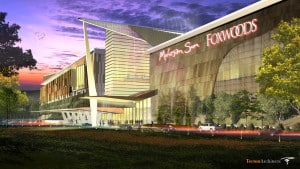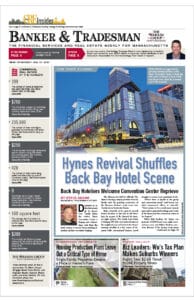
The 200,000-square-foot "Tribal Winds" satellite casino in East Windsor, Connecticut, is intended to protect Foxwoods’ and Mohegan Sun’s market share as MGM Springfield nears completion. Courtesy image
Connecticut politicians and Native American tribal leaders swung mallets during a demolition ceremony at a vacant cinema complex in East Windsor, the Nutmeg State’s chosen site for a satellite casino designed to head off competition from MGM Springfield.
The $960 million downtown Springfield casino is scheduled for completion this fall, and the owners of Foxwoods and Mohegan Sun casinos had hoped to begin welcoming gamblers to their own joint venture in advance of MGM’s opening. But unexpected federal regulatory roadblocks have held up the East Windsor groundbreaking indefinitely.
At this month’s ceremony, leaders of the Mashantucket Pequot and Mohegan tribes said they expect a lawsuit they filed against the U.S. Department of the Interior to be decided this year in their favor. But a drawn-out court battle promises to bolster MGM Springfield’s market share and further cut into the Connecticut casinos’ revenues, which peaked a decade ago.
“Any delay is going to help MGM,” said Jacob Raver, an attorney for Boston-based law firm Goodwin.
The two Connecticut tribes cite a consultant’s study predicting that new casinos in the Northeast will cost them over $700 million in annual revenues, including $100 million that they pay the state of Connecticut under revenue-sharing agreements dating back to the early 1990s.
Along with the Springfield project, the Connecticut casinos face growing competition in upstate New York, where the $1.2 billion Resorts World Catskills casino opened in February. Mohegan Sun came up short in its attempts to break into Greater Boston, where the Massachusetts Gaming Commission in 2014 picked Wynn Resorts’ Everett site over the Mohegans’ proposal for a resort casino at Suffolk Downs.
Mohegan Sun is challenging that decision in Suffolk Superior Court while the $2.4 billion Wynn Boston Harbor casino continues construction.
Uniting Against the Competition
After absorbing rising competition in a Northeast casino market they once had all to themselves, the owners of the rival Foxwoods and Mohegan Sun casinos formed their first joint venture in 2015. The tribes scouted sites along the I-91 corridor between Hartford and the Massachusetts border.
“We’re seeing the effects of market saturation in this region, and Foxwoods and Mohegan Sun are looking to find some way to stem the flow of cash back to Massachusetts,” said Paul DeBole, professor of political science at Lasell College in Newton. “It’s a good business strategy.”
The “demolition ceremony” took place instead of a groundbreaking because the tribes still need approval from the U.S. Department of the Interior to begin construction of Connecticut’s first Native American-owned casino not located on tribal lands. The tribes and state of Connecticut filed suit in November against the interior department after it failed to take action on an amendment to Indian gaming compacts needed for the East Windsor project to get off the ground.
A Risky Bet on Expansion
The compacts, approved in 1991 and 1994, granted Foxwoods and Mohegan Sun exclusive rights to operate casinos in Connecticut, in exchange for giving the state a 25 percent cut of all slot machine revenues. The same formula would apply at the East Windsor casino, a 200,000-square-foot facility that would be dwarfed by MGM’s Springfield’s 759,000-square-foot resort.
Proponents of the East Windsor project attribute the federal delays to intense lobbying by MGM on Trump administration officials.
Ken Salazar, who was secretary of the interior under President Barack Obama and is now is a partner at the law firm WilmerHale, argued in a March 2017 letter to Connecticut Gov. Dannel Malloy that the tribes could jeopardize the existing gaming compact. Describing the 25 percent revenue figure as “unusually high,” Salazar warned that the interior department would be tempted to reduce the state’s share of slot revenues.
Connecticut legislators specifically required the federal review as part of the bill authorizing the third casino, Goodwin’s Raver noted. That may have been a strategy to ensure that the state’s existing revenue share wouldn’t be jeopardized, he said. But in the short term, it may have backfired.
“Why would (lawmakers) add something that could go wrong? The Connecticut legislature didn’t want to gamble at all with the current slot revenue-sharing agreement,” he said.
The federal lawsuit, filed by the tribes and Connecticut Attorney General George Jepson, argues that the amended compact was effectively approved because Secretary of the Interior Ryan Zinke failed to act on it within 90 days.
Competition from MGM Springfield and other new gambling venues will deliver a major financial blow to Foxwoods and Mohegan Sun, according to recently updated market research by Clyde Barrow, a professor at University of Texas Rio Grande Valley and longtime casino researcher.
A study by Barrow’s consulting company, Pyramid Assoc. LLC, estimates that Connecticut residents will spend over $252 million annually at Massachusetts and New York casinos. The study, commissioned by Foxwoods and Mohegan Sun, predicted that could result in the loss of 9,300 jobs at the casinos and in related industries that provide them with goods and services.








